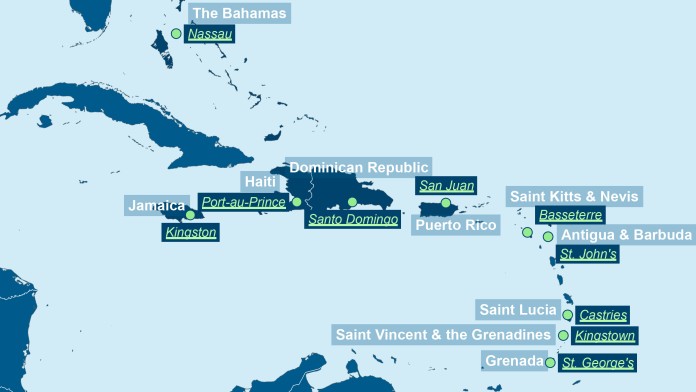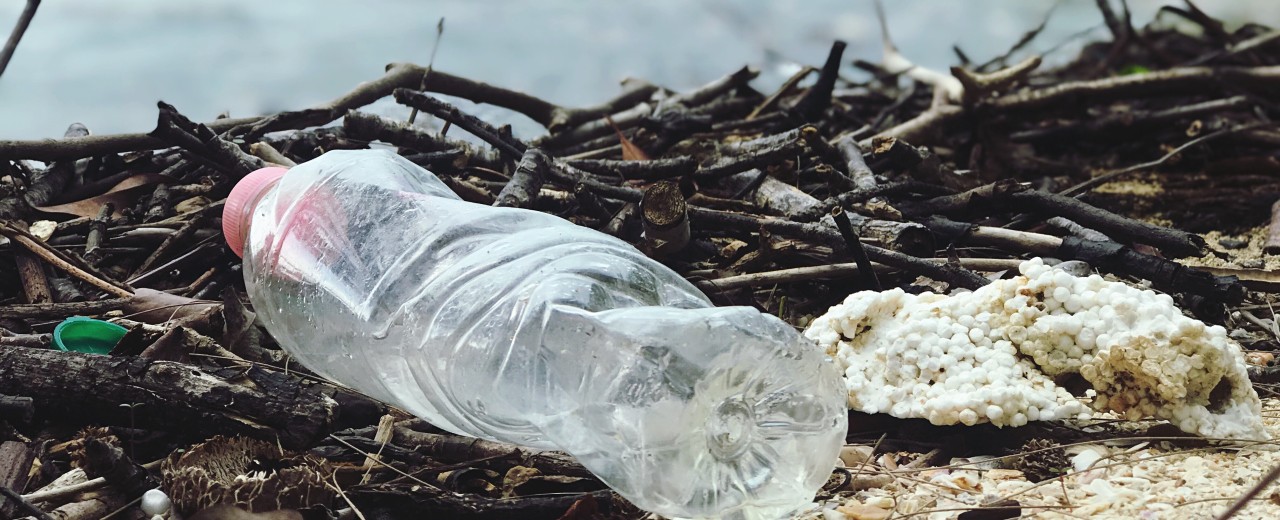
As of: 06/2025
The Caribbean islands are known for their unique biodiversity. They provide a habitat for more than 12,000 species, many of which can only be found there. The expansive coral reefs and mangrove forests serve as a nursery for young sea creatures and offer natural protection against storms, coastal erosion and flooding. But these natural wonders are under threat. In addition to climate change, pollution from marine litter is considered to be a significant stress factor for these valuable ecosystems. In order to contribute to reducing marine litter in the Caribbean, KfW is financing the Caribbean Biodiversity Fund's Circular Economy Facility on behalf of the German Federal Ministry for Economic Cooperation and Development (BMZ).
The Caribbean islands are well-known for their diversity of plants, fish and other animals that make this area unique in the world. However, this fragile ecosystem is threatened by numerous, mostly man-made, negative influences such as marine litter. Up to 2,000 waste items currently gather in the Caribbean for every kilometre of coastline. Since effective regulations and appropriate infrastructure are often lacking, a large part of the solid waste generated is not disposed of in an organised manner. 22% of Caribbean households dispose of their solid waste in rivers and other waterways that transport solid waste to the ocean. In addition, fishing nets that are no longer in use are left to drift in the sea. After the Mediterranean, the Caribbean is the most polluted sea in the world today. This is detrimental to tourism and fisheries, which make up the livelihoods of many people in the region.
Pollution has a significant impact on marine biodiversity and ecosystems. Marine organisms such as the Caribbean manatee or endangered species of sea turtles are at risk of getting caught in or swallowing marine litter. This also impairs the growth and regeneration of young mangrove seedlings. Solid waste in the ocean can also augment pollutants and cause bacterial pollution, threatening the delicate coral reefs. The circular economy strategy offers one approach to effectively and sustainably reducing (marine) litter. It aims to extend the life cycle of products and materials or to improve the life cycle through reuse, repair and recycling as well as sustainable product design and production processes, so that there is less solid waste overall. However, despite increasing recognition and attention for this approach, only close to 10% of the global economy is circular so far.

The project, which KfW is financing on behalf of the Federal Ministry for Economic Cooperation and Development, aims to contribute to reducing marine litter in the Caribbean. The creation of the Circular Economy Facility under the umbrella of the Caribbean Biodiversity Fund (CBF) has created a financing mechanism to boost the circular economy in the Caribbean and reduce the threat to the marine environment caused by solid waste in selected areas. The CBF is a nature conservation fund founded in the region with the support of KfW and has been in existence for twelve years. The Circular Economy Facility is an extension of the CBF’s work. KfW is financing the set-up and operation of the Facility with EUR 25.7 million on behalf of the German Federal Government.
The circular economy is about repairing, reusing and recycling products. This effectively reduces the amount of waste. The newly created financing instrument will provide funds in up to nine Caribbean countries and territories to support at least 18 selected individual projects that are suitable for promoting and implementing the circular economy. Measures are promoted along the entire life cycle of products, from new product development to optimised design. It also supports improved waste management.
The Facility also finances measures to collect and dispose of or recycle solid waste already present on beaches and in the sea. In addition, the Facility also promotes education and public relations work in order to sustainably change the behaviour of the population, increase awareness of the issue of environmental protection and reduce the amount of waste by way of example in individual projects.
Non-governmental organisations, universities, public institutions, civil society organisations and the private sector may submit applications for promotional funds from the Facility. The project will be implemented in the following Caribbean countries and territories:
Through a competitive selection process, the CBF will ensure that it only funds projects that directly and effectively address the problem of marine pollution. Particular attention will be paid to the sustainability of the proposed measures.
By reducing the threat created by marine pollution in selected areas of the Caribbean, the project is contributing to the conservation of marine ecosystems and biodiversity. This will also benefit the Caribbean population, whose livelihoods are particularly dependent on healthy ecosystems. During the term of the project, it is expected that around 20,000 people will have benefitted from this project by 2030. In addition, a clean Caribbean will benefit all 43 million inhabitants of the region. The project is also part of the Clean Oceans Initiative (COI), an initiative of several development banks.
The project contributes to the achievement of these following United Nations Sustainable Development Goals:
KfW Group
KfW Development Bank
Biodiversity and natural resources, Latin America and the Caribbean
info@kfw-entwicklungsbank.de
Share page
To share the content of this page with your network, click on one of the icons below.
Note on data protection: When you share content, your personal data is transferred to the selected network.
Data protection
Alternatively, you can also copy the short link: https://www.kfw-entwicklungsbank.de/s/enzByAnO
Copy link Link copied